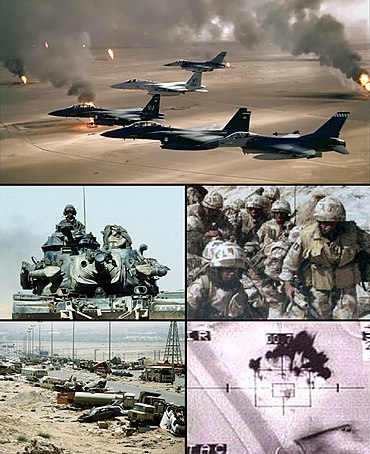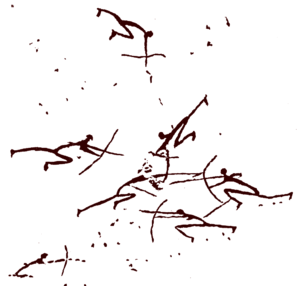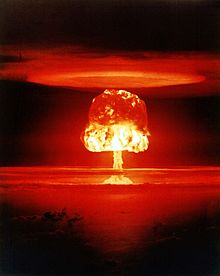War
![]()
The title of this article is ambiguous. For other meanings, see War (disambiguation).
War is defined as an organized conflict fought with considerable means, weapons and violence, in which collectives acting according to plan are involved. The goal of the collectives involved is to assert their interests. The conflict is to be resolved by fighting and achieving superiority. The violent actions that take place for this purpose deliberately attack the physical integrity of opposing individuals and thus lead to death and injury. In addition to damage to those actively involved in the war, there is always damage that is either not directly intended or can be war tactics ("scorched earth"). The former are euphemistically referred to today as collateral damage or concomitant damage. War damages or even destroys infrastructure and the livelihoods of collectives. There is no uniformly accepted definition of war and its distinction from other forms of armed conflict.
Forms of war are diverse and not necessarily tied to states or state systems: They can also take place within states, for example as civil war, war of independence or armed conflict, and lead to world war or genocide. Despite intensive discussions, it has not been possible to agree on a uniform definition under international law that delimits the concept of war. The Geneva Five-Power Agreement of December 12, 1932, therefore replaced the unspecific term "war" with the unambiguous one of "use of armed force" (Article III). Finally, the United Nations Charter prohibited the use of or threat of force in international relations as a matter of principle (Article 2, Clause 4) and permitted it only as a sanction measure decided by the Security Council (Article 42) or as an act of self-defense (Article 51).
In the historically documented history of mankind, almost 14,400 wars are said to have taken place, to which approximately 3.5 billion people are said to have fallen victim. Since an estimated 100 billion people have lived to date, this would mean that every thirtieth citizen of the earth lost his or her life through acts of war.
![]()
This article or subsequent section is not sufficiently supported by evidence (for example, itemizations). Information without sufficient evidence may be removed soon. Please help Wikipedia by researching the information and adding good supporting evidence.
Does the following Jongman source actually refer to the estimate cited above? Possibly, but certainly not directly to Baylis' source. Would have to be checked separately. For this, some completely unsuitable sources were given around the paragraph, which had to be deleted. Here possibly not better. Therefore to the security building block
However, a critical assessment of this estimate mentions that one of the representatives of this estimate reduced the number of war victims from about 3,640,000,000 to about 1,240,000,000.
While individual or collective robbery and the deliberate killing of people are generally considered crimes today and are punishable in a state governed by the rule of law, "war" is not regarded as an ordinary crime, but as an armed conflict between collectives that see themselves legitimized to do so. War thus partially or completely abolishes the civilizational limitation of violence to an executive, which the rule of law presupposes as a rule: Armed armies representing entire peoples or ethnic groups face each other. These are thus warring parties.
Warring parties judge their own participation in the war as necessary and justified. Their organized collective power thus requires legitimation. War as a state action therefore requires a law of war within a state as well as a law of war to regulate interstate relations. This distinguishes above all war of aggression from war of defense.

Images of a "modern" war (Second Gulf War)
The word war
The word "war" (from Old High German chreg > Middle High German kriec) originally meant "tenacity," "effort," "strife," "battle," "armed conflict." Middle Low German krich and Middle Dutch crijch are also located in this etymological environment. An academic reconstruction traces New High German "war" back to the Indo-Germanic root *ggghwrei-. This has its equivalent in Greek brímē meaning "violence, force, impetuosity" and hýbris meaning "arrogance, violence".
In a broader linguistic-historical context, the New High German word "power" is also placed here, possibly originating from the same Indo-European root. The wide range of meanings is reflected by the Old Frisian halskrīga meaning "stiffness of the neck" and the presumably related Old Irish bríg meaning "strength, power" and Latvian grînums for "hardness, severity." The collective singular subsuming all wars emerged around 1800, and older encyclopedias treat individual wars or specific issues of warfare under "war." An obsolete word for war is orlog (still Dutch and Afrikaans: oorlog).
The verb "to wage war on someone" means on the one hand "to wage war on him", on the other hand the basic word kriegen has the meaning "to get, to receive something", "to catch someone".
Definitions
There are various attempts to define the phenomenon of war.
Presupposing a state system, the Prussian major general, military scientist and ethicist Carl von Clausewitz defined "war" as the highest form of self-assertion of a people. This was fully in keeping with the spirit of the times, when the French Revolution and the conflicts that grew out of it had led to the formation of conscript armies and guerrillas. Such popular armies and popular wars supported the view that war was an existential struggle.
In the years that followed, however, Clausewitz narrowed this view considerably and assumed that war served more as an instrument.
"War, then, is an act of force to compel the adversary to do our will."
- Clausewitz: On War, Book I, Chapter 1, Section 2
More generally, and thus for societies at different levels of differentiation or development, the U.S. cultural anthropologist and war researcher Richard Brian Ferguson (1984) gives a definition of war. He defines "war" as a purposeful action by one group, usually organized, against another group that involves the potential or actual use of force.
Political scientist Sven Chojnacki puts it even more generally: war is the "extreme form of military violence between at least two political groups."

Mesolithic warfare (ca. between 9600 and 5000 BC ) between two groups of archers. Morella la Vella, Castellón Province, Eastern Spain

Atomic bomb test "Romeo" (explosive power 11 megatons) March 27, 1954 - example of a "worst case scenario".
Questions and Answers
Q: What is war?
A: War is a situation or period of fighting between countries or groups of people, which generally involves the use of weapons, a military organization and soldiers. It is a situation in which a nation enforces its rights by using force.
Q: Is every armed conflict considered to be a war?
A: No, not every armed conflict is considered to be a war. A fight between individuals, between gangs, drug cartels etc. is not considered to be a war. However, most wars are called armed conflicts.
Q: What does international humanitarian law try to do?
A: International humanitarian law tries to limit the effects of wars by recognizing two kinds of wars; international armed conflicts between two or more states and non-international armed conflicts as being between a government and group that is not a government or one that is between two such groups.
Q: Who wrote On War?
A: Karl von Clausewitz wrote On War, which was his classic book about military philosophy that remains the most influential work on the history and strategy of war.
Q: What did Sun Tzu view war as?
A: Sun Tzu viewed war as a necessary evil; something people do in order to achieve their goals.
Q: What are some reasons why wars have been fought throughout history?
A: Wars have been fought throughout history for various reasons including control over natural resources, religious or cultural differences, political balances of power, legitimacy (correctness) of particular laws, arguments over land or money and many other issues.
Q: Are there usually multiple causes behind any given war?
A: Yes, while any given war can start for just about any reason there are usually multiple causes behind it.
Search within the encyclopedia